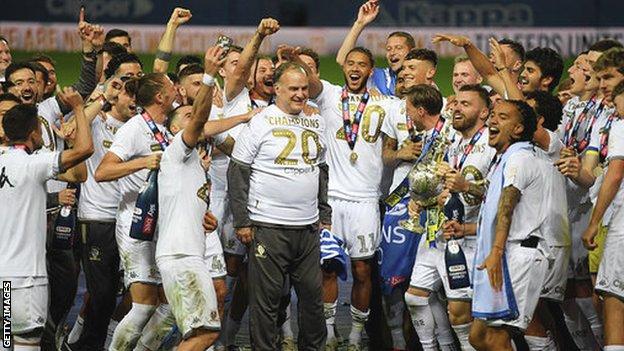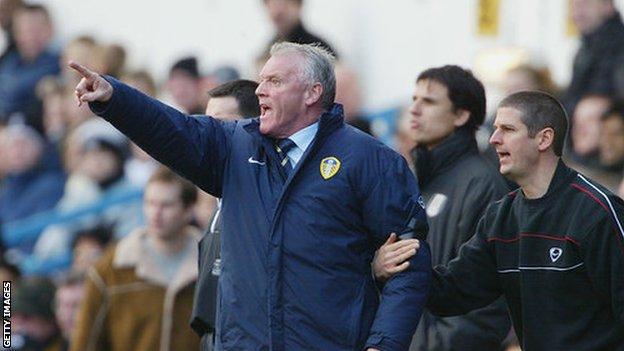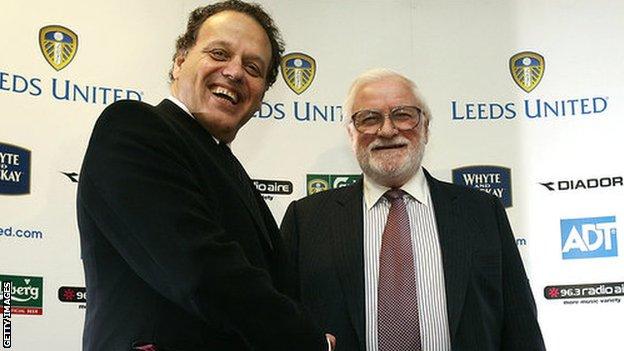Leeds return to Premier League: Gerald Krasner remembers pain of 2004 relegation
Last updated on .From the section Leeds United

When Leeds United walk out to face champions Liverpool on Saturday they will do so as an upwardly mobile club with a bright future under Marcelo Bielsa.
It is a stark contrast to the state they found themselves in on 2 May 2004, when the only defiance came from their supporters as Leeds collapsed to a 4-1 defeat at Bolton and slid out of the Premier League, unable to return for a scarcely believable 16 years.
There will, of course, be no supporters at Anfield because of coronavirus restrictions. If the opportunity had allowed, the visiting allocation could have been sold many times over.
But even with no fans, it is the game of the opening top-flight weekend - two of England's biggest clubs colliding, just as they used to before one of them collapsed, going from Champions League semi-finalists to Championship-bound in exactly three years.
"It was the biggest thing of its time," said Gerald Krasner, the club's chairman in 2004. "Let's be honest, Leeds were the first of many clubs that spent to get success and didn't do it.
"You still see it today - clubs paying ridiculous wages and transfer fees to get into that golden zone known as the Premier League.
"Leeds were bottom of the table when we bought it but I was the chairman who took it down. That will never be forgotten."
- How Leeds midfielder Phillips earned his England call-up
- 10 moments that were pivotal in promotion under Bielsa
This summer, Krasner has been the public face of attempts to keep Wigan Athletic afloat after the Latics were put into administration by their Hong Kong-based owner.
Sixteen years ago, Krasner was a chartered accountant who had developed an impressive reputation as an insolvency practitioner, offering advice to companies without the means to pay their debts.
Crucially, he was also a Leeds fan.
The financial slide at Elland Road that started under the chairmanship of Peter Ridsdale gathered momentum under Professor John McKenzie. By the beginning of 2004, Leeds were in a desperate state.
"For 30 years in my business life I have been telling people what they did wrong," said Krasner.
"I thought it was about time I showed people I could do it. I have never been frightened of putting my neck on the block, which is why I did the job when nobody else wanted it."
Krasner put together a consortium of local businessmen to rescue the club. Others, including former Bradford City owner Geoffrey Richmond, were also involved, but Krasner was very much the public face.
"It was an interesting experience, especially on Thursday nights when the News of the World would phone you up hoping you were drunk, to get a story," said Krasner.

Just as Bielsa is now afforded hero status for guiding Leeds back to the Premier League, so the man who took them down, Eddie Gray, remains a legendary figure at the club, with fans believing the Scot was placed in an impossible position when he was asked to take over as manager in November 2003.
As it turned out, Gray, who will be at Anfield in his role as co-commentator for LUTV, presided over a 2-1 victory against Manchester City in Krasner's first game as chairman.
But behind the scenes, Krasner was grappling with some major issues.
"The debts were just over £100m, which doesn't sound a lot now - one centre-forward. In 2004 it was ginormous," he said.
"Trevor Birch was running the club. He knew me professionally because I used to lecture to him in the 1990s. He told me what was owed and to whom. We had to put £20m into our solicitors' account. We found it - we borrowed it. My guys mortgaged themselves to the hilt.
"For six weeks, I finished work at 5pm and from 6 until 2 in the morning we went to our law firm. They had a night shift on for me. We had 113 agreements to sign.
"People say: 'Did you enjoy it?' I didn't enjoy it once. Don't buy a football club if you suffer from stress.
"You sit there and watch a goal go in and you are a million quid ahead, one goes against you and you are a million quid down. There were professional firms who did diabolical things in the name of money.
"I sold the stadium and training ground but I did it in such a way that meant they could both be bought back. The stadium already has been. We obviously sold a lot of players. A year later the debt was down to £24m, which was still too much.
"There was so much firefighting. Initially, every day when I went home I thought: 'That's another one we have survived.' Eventually it went week to week, but the money pressure was always there.
"We were doing deals with everybody to mitigate the debt. I spoke to the Inland Revenue and asked them to give me three years to sort a £10m debt. When we sold the club we were down to £3m. I don't think they thought I would last three months."

Krasner sold to former Chelsea owner Ken Bates in 2005 and after their relationship turned sour he drifted away from the club.
Krasner remains a fan and it is a source of acute sadness to him that Norman Hunter, Jack Charlton and Trevor Cherry, three legendary Leeds players - the first two of whom he knew personally - are not around to witness the rebirth of their old club.
He acknowledges his place in the Leeds United journey but knows it is the time for others to enjoy the limelight, hopefully with rather less stress than he endured.
"The thing is, you don't own a football club," said Krasner. "You might in law, but really you are just a trustee for the next generation."

- Liverpool's 30-Year Wait: Behind the scenes of their title triumph
- Introvert or extrovert: Can you truly be one or the other?




















